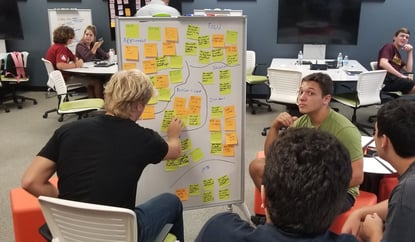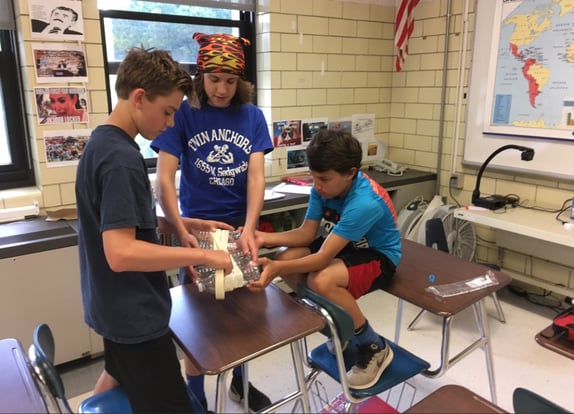.jpg?width=653&name=2016-09-01%20Glenbard%20South%20-%20Student%20Team%20(2).jpg)
In this moment of rapid change in our world, including our education system, entrepreneurial mindset and skills feel more critical than ever. At Uncharted Learning, we define entrepreneurial mindset as a set of beliefs and approaches and behaviors that influence how to learn and tackle problems. An entrepreneurial capacity empowers students, teachers, schools, and districts to approach challenges as opportunities to define problems, experiment, learn, and iterate in response to real-world influences.
Learning to Build an Entrepreneurial Mindset
I’ve found myself reflecting on the most effective ways to build the entrepreneurial capacity of our education system. Instead of exploring these questions on my own, I invited Amber Ravenscroft, Manager of Innovation for The EdVenture Group, to join me for a virtual fireside chat. Amber is a rising star in the field of youth entrepreneurship, and is deeply passionate about integrating entrepreneurship education across the curriculum. Here's are some highlights of our conversation.
Ashley Blackburn (AB): What does “entrepreneurship across the curriculum” mean to you? How did you identify this as an area of focus and a personal/professional passion? Why is this something schools should be exploring?
Amber Ravenscroft (AR): My personal philosophy, and one that’s integrated into the work we lead at The EdVenture Group and our partnership with the National Consortium for Entrepreneurship Education (EntreEd), is that entrepreneurship education is relevant in any and all academic subject areas. When we say, “entrepreneurship across the curriculum” it means that we’re fostering teacher mindsets to infuse entrepreneurship into their core curricula and lesson plans. For example, a math teacher would teach statistics via a lens of customer discovery to reveal trends/insights. This entrepreneurial approach to teaching makes learning relevant for every student, and helps them recognize how different technical skills they’re building during their time in the classroom applies to the outside world.
 Growing up, my father was an entrepreneur – he owned his own custom carpentry business in rural Western Maryland. For years (actually the entire duration of my childhood/teenage life) when somebody would ask what my parents did, I would respond “Oh my dad, he’s just a carpenter.” I truly did not associate my father with the idea of being an entrepreneur, due to my own lack of exposure to these types of educational experiences to recognize the value in owning and operating your own business or appreciating the mindsets that allowed him to take the risk to start one. Now, I’m blessed to work in a company that encourages me to be entrepreneurial every day, and I think it’s become my passion to help students recognize that there is an immense opportunity for them to make their own paths in life, rather than following those that have been carved out for them.
Growing up, my father was an entrepreneur – he owned his own custom carpentry business in rural Western Maryland. For years (actually the entire duration of my childhood/teenage life) when somebody would ask what my parents did, I would respond “Oh my dad, he’s just a carpenter.” I truly did not associate my father with the idea of being an entrepreneur, due to my own lack of exposure to these types of educational experiences to recognize the value in owning and operating your own business or appreciating the mindsets that allowed him to take the risk to start one. Now, I’m blessed to work in a company that encourages me to be entrepreneurial every day, and I think it’s become my passion to help students recognize that there is an immense opportunity for them to make their own paths in life, rather than following those that have been carved out for them.
AB: What tips do you have for high school teachers seeking to integrate entrepreneurship into lesson plans?
AR: High school is such an awesome age group to work with. My advice to teachers would be this:
- Listen to your students. The first step of the design thinking process is empathy, so truly get to know your students and where their passions lie.
- Use problem-based learning in the classroom. This will feel
.jpg?width=300&name=INCUBATOR%20PITCH%20(51%20of%2055).jpg) uncomfortable, as it forces you to step outside of the traditional “teacher” role into more of a facilitator of student learning, but we have to be uncomfortable to grow. As my colleague Toi at EntreEd would say, “Give them the un-Googleable questions”.
uncomfortable, as it forces you to step outside of the traditional “teacher” role into more of a facilitator of student learning, but we have to be uncomfortable to grow. As my colleague Toi at EntreEd would say, “Give them the un-Googleable questions”. - Practice saying “I don’t know.” One of the scariest things for teachers (that we’ve found thus far in our professional development programming) is the idea of not knowing the answer when students ask a question. If this happens in an entrepreneurship space, you’re moving in the right direction.
- Start with mindset first. It’s a huge leap from the periodic table to value proposition statements. If you’re looking for somewhere to start, look into embedding small “design challenges” and “creativity contests” into your academic subject that spark innovation and ideation – details come later.
AB: How can professional development support teachers in building entrepreneurial mindset into their curriculum?
AR: Teachers are honestly superheroes - especially now. They navigate a constantly changing world, have to serve their “customers” daily, and are assessed on a pretty rigorous set of standards. I think the first thing professional development can do to support teachers is to help them recognize their already inherent entrepreneurial mindset. They’re constantly coming up with ways to support students in creative and customized approaches – what’s more entrepreneurial than that?
Further, there’s a principle of effectuation - this idea of a “crazy quilt” – that highlights the idea that entrepreneurship is inherently a collaborative process. I think professional development and forming networks of “innovative educators” interested in this space is necessary for movement forward. In West Virginia, we’re working with career and technical education teachers through an Appalachian Regional Commission grant to transform technical classrooms into entrepreneurial learning environments. By creating a community of practice with these educators, we’ll see them lead innovation in the state to create the next generation of young entrepreneurs that are poised to launch viable businesses within their home communities.

AB: What specific tools and activities would you recommend to build high school students’ entrepreneurial mindsets across the curriculum?
AR: I can think of tons!
- I love empathy maps to help students build their empathy/customer discovery skills.
- The Right Question Institute has some great resources on how to get teachers and students asking good questions.
- Design thinking is a must. We recommend Intuit’s Design for Delight (D4D) model – which really streamlines the process.
- Project- and problem-based learning is huge. You can check out PBL Works for great resources on this in the classroom.
- Mentorship – I think mentorship is key in supporting young entrepreneurs. If you can connect them to businesses in your local area, or virtually to mentors across the globe in fields they're interested in, that’s an awesome resource for students to explore their passions.
- Personal branding – I had a college professor once who told me “If you can’t sell yourself, you can’t sell anything.” It resonated with me tremendously and still does to this day. I think framing students' understanding of themselves as a product is an awesome way to get them thinking entrepreneurially about their own future.
Meet Amber Ravenscroft
 As the Manager of Innovation for The EdVenture Group, Amber Ravenscroft designs and develops technology-based solutions for K-12 education, with a focus on integration in the classroom. To date, Amber has secured over $4M in private and federal funding to incorporate innovative youth programming and professional development across Appalachia and the nation. She has a passion for entrepreneurship education, STEM innovation, and youth leadership. Connect with Amber on LinkedIn.
As the Manager of Innovation for The EdVenture Group, Amber Ravenscroft designs and develops technology-based solutions for K-12 education, with a focus on integration in the classroom. To date, Amber has secured over $4M in private and federal funding to incorporate innovative youth programming and professional development across Appalachia and the nation. She has a passion for entrepreneurship education, STEM innovation, and youth leadership. Connect with Amber on LinkedIn.
Learn more about how Uncharted Learning is empowering the entrepreneurial capacity of students and teachers via programming, including youth entrepreneurship programs and professional development. Check out our new educator workshop that supports the integration of entrepreneurship into existing courses.

